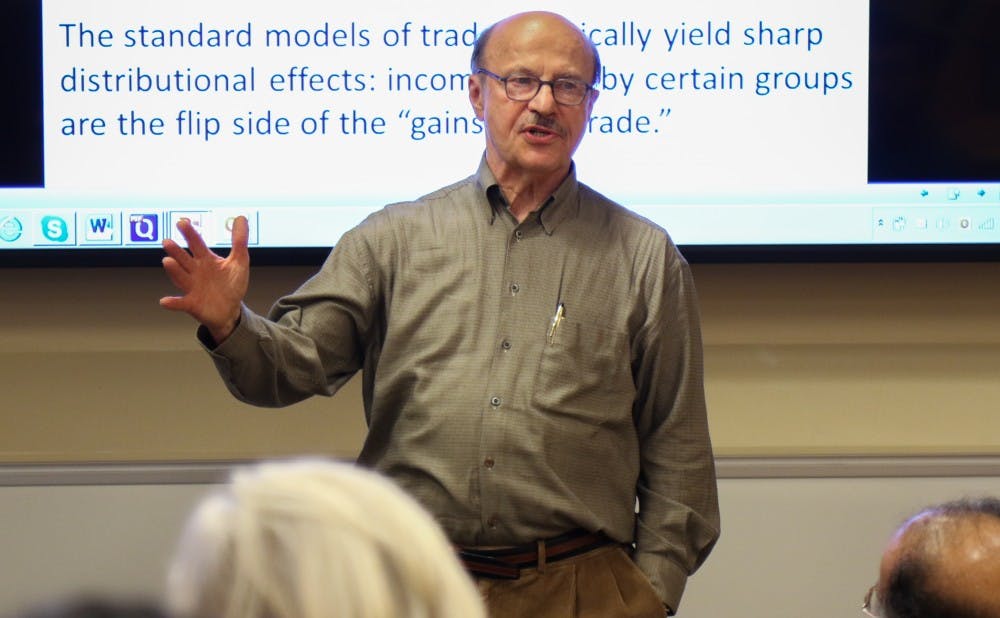Only 30 minutes into visiting economics professor John Komlos’ talk on Donald Trump’s rise to the presidency, the audience erupted into chaos.
Komlos, the former chair of economic history at the University of Munich, discussed “Globalization and the Rise of Trump” on Wednesday in front of a 60-person crowd. He argued that "Reaganomics" and unfettered globalization had paved the way to Trump’s victory, but members of the audience soon accused Komlos of proposing socialist ideas.
“We’re talking about millions of people who are hurting and who are going to destroy the system and voted for a demagogue,” Komlos said.
At the beginning of the talk, Komlos criticized tax cuts during Republican Ronald Reagan's administration as “the worst thing that could happen to this economy.” He said that the proposed "trickle-down benefits" from the wealthy to the poor never actually materialized, and that income inequality has worsened as a result.
“Everything goes to the one percent,” he said. “That's why I say trickle-down is really voodoo economics.”
Komlos also criticized the pace of globalization in recent decades, which he said caused economic disruption in the Rust Belt—a region in the Northeast and Midwest that has recently suffered industrial decline.
“The dislocation that globalization did to this country, destroying tens of thousands of neighborhoods, is what led us to Trumpism,” he said. “The lower middle class sat in Akron, Ohio and said, ‘look at those guys making big bucks when here I can't pay my electric bill.’”
And the “terrifically powerful forces” of globalization have gone too far in aiding developing countries, he said.
“You cannot bring Indians out of poverty at the expense of people in Toledo or Buffalo,” he said. “That doesn't work because you're destroying America.”
Several professors in the audience objected to Komlos' arguments, however.
Corinne Krupp, associate professor of the practice in the Sanford School of Public Policy, criticized Komlos for treating global economics as a “zero sum game.” And in a back and forth exchange, a student accused him of “leaning towards socialistic policies.”
Komlos argued in response that helping financially-distressed citizens did not equate with socialism—and that new policies were indeed necessary to correct years of governmental mistakes.
"Our policies clobbered [the Rust Belt poor] in the head,” he said. “We burnt their houses down by allowing globalization to come into this country and destroy millions of millions of jobs. We—the government, the politicians, the economists."
He also cited an article arguing that economists were partially responsible for Trump’s victory because they had failed to note the pitfalls of free trade. However, Indermit Singh Gill, professor of the practice of public policy, came to the group's defense.
“But this is just totally wrong. You know this,” Gill said, sparking laughter in the audience. “Economists talk about government policies all the time.”
Graduate student Jake Guo noted that Komlos’ ideas contradicted mainstream economics and, in some cases, were “pretty radical.”
“A lot what he said was correct, but overall, he should have talked more about the global view to see the trade benefit from other countries,” he said. “It would have been more balanced.”
In response to a question about how much people were to blame for their own economic troubles, Komlos said the present system is the larger culprit. For older generations, he said the lack of industrial mobility inhibited workers, whereas younger people could be victims of poor education.
He argued that the government should have bailed out distressed homeowners in the same way they bailed out banks—criticizing President Barack Obama for bailing out Wall Street and doing nothing for Main Street.
Despite objections from Gill and others, Komlos said “establishment” policies have led to the current situation, which he said in fact amounted to the destruction of American democracy.
“You talk about the Russian oligarchs, we have one ourselves," he said.
Get The Chronicle straight to your inbox
Signup for our weekly newsletter. Cancel at any time.

